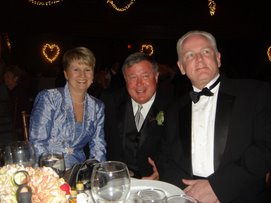2010 - A Year in Review
2010 – A Year in Review
Just a few days remaining before we put a lid on the year 2010, the first year of my sixth decade running around this planet in this body, which seems to be holding up remarkably well given the abuse it has taken over the years. I will remember it as the year that my Ellie started her transformation from a young girl into a young woman, and the year that my Mom made her transition from life on earth to what I sincerely believe is a peaceful and joyful union with God. Suffice it to say that I miss my Mom and I think of her constantly – last night I was having a snack with Joe and Ellie at the food court in Phipps Plaza before we entered the movie theater to watch “True Grit” and Ellie said something that created this tremendous visual image of my Mom. But as I tried to explain it to them, they just looked at me with puzzled faces because they could not grasp the image that sat so vividly in my mind’s eye. Oh well, I suppose that is natural given how much longer I had spent with my Mother over the years. I just hope the kids don’t think I’m having some weird flashback from the 60’s!
Anyway, back to 2010. So much happened this year across so many spectrums – geographical, political, financial, ecological, religious – where to start? I suppose the key player from my perspective has been the continued financial meltdown for so many people across the globe. People have lost their jobs, their homes, and in many ways, their very identity. So many of us think about ourselves in terms of what we do for a living, who we work for, how much money we have invested and what’s going on with those investments – where our kids go to school today and where they will go to school tomorrow. We create these identities that are tied to money and material belongings, and suddenly all of these creature comforts are removed from our lives. People are living with relatives, with friends, in their cars and on the streets. People are reduced to worrying about where they are going to find the next meal for their children and all the other worries that used to keep them up at night have evaporated along with any concept of stable employment or a right to work. Companies are sitting on hoards of cash, not hiring…………..just sitting on the sidelines waiting for some financial miracle to occur, some sudden recovery of the housing market, the job market, the global market. Just sitting and watching instead of being the initiators, the creators of that miracle. As I’m sitting here writing this missive, I received a note from a friend in NYC who has just been turned down again – a brilliant young woman who well educated, is well traveled, who has incredible experience across a multiplicity of disciplines, and yet she can’t get a job! What’s does that say about our future when an extraordinarily talented thirty-four year old woman can’t find a position in NYC? What part of Economics 101 don’t people get? If we don’t create jobs that create paychecks that get spent in the economy that create jobs that create paychecks, then this thing is never going to get kick-started! Hell, you don’t need a PhD in Economics to know that people have to work to survive and if corporate America doesn’t stop sitting on the cash and start investing in our national future, then there will be no national future. Don’t even get me started on China and how far ahead they are in so many areas, but especially Education.
We continue to fund two senseless military engagements that are bleeding us of essential funds needed to help launch a nationwide recovery. We just reconfirmed a tax concession for the wealthiest one percent of the national wage earners who allegedly create employment, which is why we reconfirmed the tax concession for them as well as others who could have easily withstood the reinstatement of the Clinton era tax rates. Remember the Clinton era – the one where we had a significant budget surplus and the unemployment rate ran in the mid-four percent range. The impact on me would have been around $7,000 on an annual basis, which isn’t a small amount of money – about $136.62 a week, but a tax rate that I would have gladly accepted if it would help the country get on track.
What happened to the concept of “asking not what your country can do for you, but what you can do for your country?” Isn’t there anyone left who still believes that this country represents the best possible form of government available to us today? Are we all so jaded and so insular that we can’t see that there are times when the needs of the many outweigh our own individual concerns?
I know, I know – you think I sound like a bleeding heart liberal, or worse, a socialist who wants to divide everything equally regardless of personal effort. But folks, I’m not either. I’m a moderate conservative and what I trust with all my heart is my faith in God, my faith in my family, and my faith in this country.
These are serious times folks and we need serious measures if we are going to pull ourselves out of this misery. We need corporate America to take those cash reserves and invest in America. We need government leaders who have the courage to stand up for what is right, not just what is politically expedient. And we need to take this year and put it behind us – far behind us!
I don’t know if we have elected leaders with true courage. I guess only time will tell, but hopefully these new leaders along with those leaders returning for the 2nd, 3rd, 4th, and longer terms will understand that time is not on our side at the moment. We need decisive action and we will be evaluating every move, every decision, and every vote.
In 2012 we will be electing a new national leader or reconfirming our faith in President Obama. Two years is a very short time, but we can do some much as a nation if we make up our minds to turn this situation around. What are you willing to do?



































